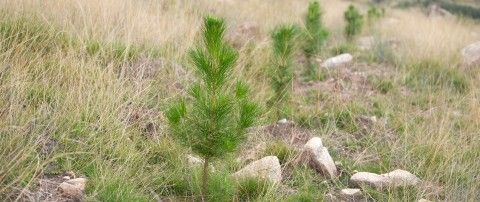

Sonae Arauco's forestry R&D project assesses the resilience of pine species and provenance
Preliminary results from Sonae Arauco's Forestry Research & Development (R&D) Project, started in 2020, suggest that radiata pine from Chile is more resilient in a Portuguese setting.
“The results are still preliminary, but very promising. Radiata pine from Chile had a very positive performance in all environments and soils where the test is being carried out, and even proved more resilient than other pine species/provenances introduced to Portugal previously”, says Nuno Calado, Wood Regulation & Sustainability Manager at Sonae Arauco, one of the world's largest companies for wood-based solutions.
In every combination of soil and climate under test, there are families of radiata pine from Chile that consistently perform the same or better than other species or provenances, that is, they have lower mortality (as is the case for sandy soils) or zero mortality (in granite and schist soils) compared to other species and provenances.
“Apparently, and despite these still being preliminary results, this pine species could help forestry producers significantly increase their production, contributing to reversing the downward trend in planted area in Portugal”, Nuno Calado adds.
In maritime pine there were no significant differences in mortality between Portugal and France provenances, with the exception of sandy soils, where pine of Portuguese provenance performed better. The high adaptability of these two provenances to granite and schist soils, where mortality was residual, is also noteworthy.
Future assessments of growth, survival, and adaptation will make it possible to identify which family or provenance of maritime pine or radiata pine is best suited to each location.
200,000 seeds, 136 families
This pioneering project, in which Sonae Arauco has already invested more than €150,000, involves over 200,000 maritime pine and radiata pine seeds from different families (136 in total) and provenances (Portugal, Spain, France, and Chile) and intends to test and compare how plants under different soil and climate conditions in Portugal perform.
In a first phase, 100,000 seeds were grown in the Furadouro nursery (Altri Florestal), under identical conditions. Then, 21,600 pine trees were planted in six different locations totalling 24 hectares, in Central and Northern Portugal: Figueira da Foz, Pombal, Mangualde, Arouca, and Ribeira de Pena, in coastal and inland areas, in areas with sand, schist, and granite soils.
In the summer of 2021, the entire process started again with the aim of eliminating the effect of weather on the results obtained in the first year: a new sowing phase, with another 100,000 seeds. As in the first year, the plants will later be transferred to the test areas.
In April 2022, an assessment will be carried out regarding the individual growth of each tree, starting the process of identifying families and provenances with the highest productivity.
The families, provenances and species selected at the end of the project will be produced at scale, in order to allow forest producers in Portugal access to plants of high genetic quality and productivity, contributing to an increase in the profitability of the pine value chain.
Sonae Arauco's Forestry R et D Project is part of the company's strategy, which aims to be an agent of change in the sector and to support the development of the national forest. It seeks to counteract the declining trend in maritime pine numbers recorded in recent decades and to contribute to aligning the availability of raw material with the expected increase in the market's demand for sustainable solutions, such as wood.
Related news
01.Related news






